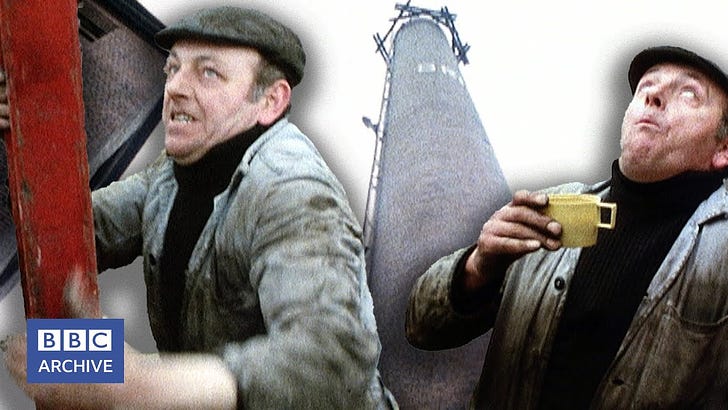On this day (6 September) in 1979, the BBC first broadcast the now legendary Fred Dibnah. What might have been considered a TV production gamble actually turned it into a cultural jackpot. When they greenlit the initial documentary on Dibnah, they weren't just filming a steeplejack with a penchant for the past; they were backing a real-life character in a story of British identity that had yet to be told.
Born in Bolton, Lancashire, in 1938, Dibnah was a steeplejack and engineer. The mere mention of his name brings up images of soot-covered faces, clanging hammers, and towering chimneys ready to meet their maker. And whilst all of that may sound dull, Fred made the shows incredibly captivating.
I've never fallen off a big chimney, you only fall off of them once
He first broke into the public eye in this BBC documentary that showed him knocking down a chimney, brick by brick, while dressed like he just stepped out of a Charles Dickens novel. It took him five months in total. This catapulted him into a sort of cult stardom. He wasn't just Fred Dibnah, the steeplejack; he was Fred Dibnah, the symbol of a bygone era, a man out of time, romanticising rivets, and bolts and steam.
I challenge you to watch a couple of minutes without your palms sweating and developing vertigo.
This was the golden age before health and safety ran amok, a time when common sense was a flat cap and a cup of tea. The Fred Dibnah programmes are like a televised time capsule, reminding us of an era when not every risk was wrapped in red tape and caution wasn’t printed on every surface. Fred used to scale 300ft chimneys with just a ladder and his wits, no harness in sight. It was this very daring that made his shows exhilarating to watch. In our modern world of disclaimers, waivers, and padded corners, Fred's exploits were a slapdash of adrenaline—a testament to human skill, intuition, and courage.
I wouldn't say that I've ever done it drunk but if you were banging away with a big hammer all day, a few pints, you know, don't do you any harm, you know it sort of kills the pain.
Not only did he climb to the top of very high towers or steeples without a harness, he put the ladders in position, by himself, in the first place.
Through series like "Fred Dibnah’s Industrial Age" and "Fred Dibnah’s Building of Britain," the man educated while he entertained. He took viewers on a rollicking journey through the country’s industrial past, making sure we knew how every gear, every wheel, every steam engine contributed to Britain’s rise as an industrial powerhouse.
Fred Dibnah passed away in 2004, but his legacy is far from forgotten. He wasn't just a man who climbed chimneys; he was a symbol of a grittier, grimier, but strangely poetic Britain that once was. In a world hell-bent on speed and technology, he reminded us of the beauty of slowing down and taking in the work of our hands and the sweat of our brows.




In Fred Dibnah, the BBC thought they had found a quirky northern working class chap.
Little did they know how incredibly intelligent and talented he was. HIs knowledge of historic buildings and architecture and engineering was staggering. It can be seen in his later series when he is shown to be far more erudite, with far more depth of knowledge, than the many professors that he meets.
A great example of how the pussified woke useful idiots have created a micro sensitivity to feelings and risk. They produce nothing yet take for granted the effort of others who provide to make their livelihood of pushing ones and zeros around in cyber space possible. The irony of claiming overpopulation is destroying the planet while creating mountains of policies and laws to remove all risk of harm in every aspect of human endeavor. Doublespeak abounds in 2023.